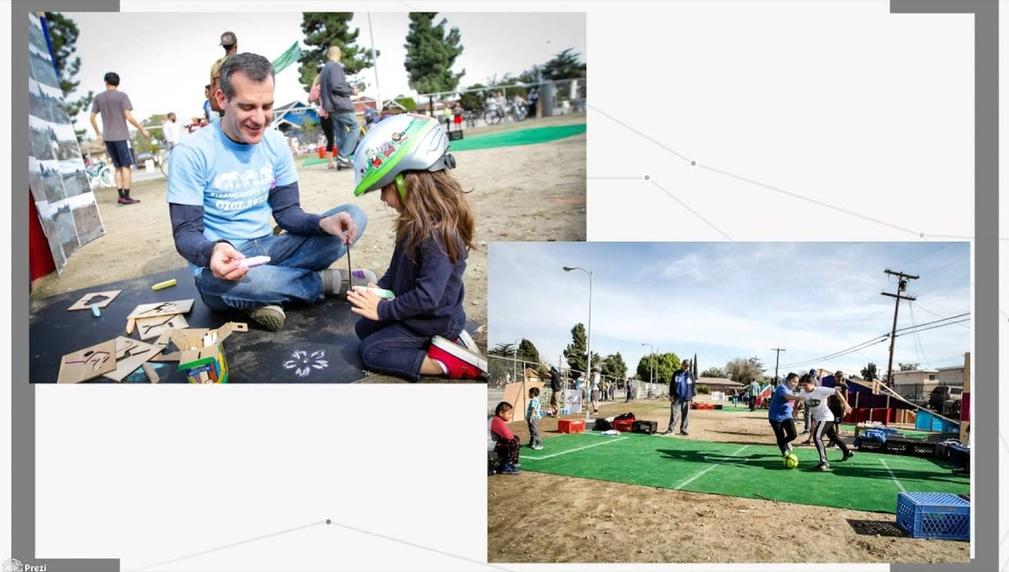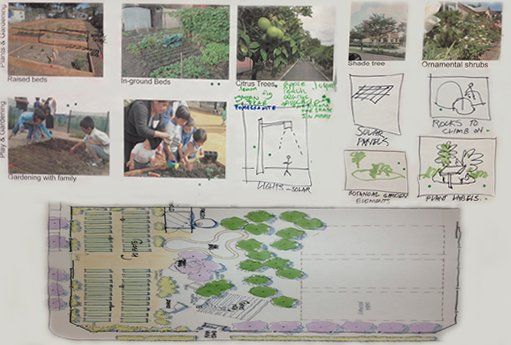Los Angeles Neighborhood Land Trust, Leadership for Urban Renewal, TRUST South LA, Konkuey Design Initiative, Esperanza Community Housing Corporation, Community Health Councils
The LA Neighborhood Land Trust partners with LA’s communities of color to develop, build, and operate safe parks and community gardens while organizing to advocate for local policies that support health and equity. LANLT will serve as lead applicant.
Visit this organization’s website to learn more

3 Submitted Ideas
 PLAY ·2015 Grants Challenge
PLAY ·2015 Grants ChallengeFREE LOTS ANGELES: Transforming Vacant Lots into Neighborhood Assets
Free Lots Angeles (FLA), a project of six organizations, works with communities to transform vacant lots into health-promoting neighborhood resources such as community gardens, parks, and mobility hubs. FLA organizes “pop-ups” on vacant lots and helps change City policy to allow for Angelenos to access city-owned vacant land in their neighborhoods, especially in places where there are not enough places to PLAY.
 CONNECT ·2014 Grants Challenge
CONNECT ·2014 Grants ChallengeMeet me in MacArthur Park
In 2015, we will work to revitalize MacArthur Park into a vibrant hub for community connection.
- 2013 Grants Challenge
A Garden of Hope A South LA Oasis of locally produced Vegetables and Fruits

Los Angeles Neighborhood Land Trust will transform an empty nuisance lot, located in a “food desert” in one of LA’s most park-poor areas, into an oasis of healthy food, community green space and economic opportunity. An urban fruit orchard, park and neighborhood farm stand—managed by residents and featuring produce grown by community garden members—will bring fresh foods and a safe place to exercise to a community severely lacking in both.
The project site is a 1-acre abandoned lot at 10500 S. Normandie Avenue, Los Angeles 90044. This is a park-poor unincorporated area of LA County in a zip code where: 54% of annual household incomes are below $25,000; 54% of residents are Latino; 45% are African American; Almost 40% live below the poverty line; 29% have less than a 9th grade education; 41% are under 19; and there are 0.01 park acres per 1,000 people (Predominately white LA neighborhoods enjoy 31.8 acres of park space per 1,000 people).
This densely populated, underserved community does not come close to meeting the National Recreation and Parks Association’s recommendation of 10 acres of park space per 1,000 residents. The area is also what is known as a food desert. The majority of residents are more than 1 mile from a supermarket and most food available is packaged and processed, similar to those offerings found at convenience stores and gas stations. This inequitable distribution of green space and food access is a pressing urban and environmental justice issue which we are addressing with this project.
We recently acquired the site through a donation from LA County and have already secured funds to construct 40 4x8 community garden beds and plant half the trees needed for an urban fruit orchard. As part of First 5 LA's "Little Green Fingers" program, we are building a "tot trail" (walk/bike/trike area) and learning garden designed for children 0-5 and their family members.
An LA2050 award would allow us to develop the whole site and serve the entire community by bringing open green space and fresh produce. A farm stand will offer fruits, vegetables and herbs grown by local farmers and members of the 40-bed community garden. Those without the time or ability to care for their own plot will still enjoy healthy, low-cost foods and interact with farmers and growers. An urban fruit orchard will provide additional farm stand offerings and a beautiful landscape with plenty of shade. A storage container with a cistern and solar panels will minimize energy needs. Open green space with picnic tables and a climbing wall will provide play and exercise opportunities and respite from the urban environment.
Land Trust Community Organizers will work with residents to form a stewardship committee to assist in maintaining and caring for the site. Resident gardeners will be able to earn extra income by selling their produce and take classes in financial literacy and entrepreneurship. The farm stand will be open to the public. The management of the farm stand will offer additional economic opportunities. A farm manager will partner with external farmers within a 50-mile radius, coordinate food delivery and lead outreach and education efforts, including offering financial classes to resident gardeners. This could include the creation of a farm-box program, wherein subscribers would receive a weekly package of produce and educational materials on how to store and prepare them. In the future, the farm manager could facilitate programs in gardening, nutrition and cooking, bringing together local students, seniors from the senior housing across the street, and those involved with the children's garden. A farm stand assistant will offer support during the farm stand’s hours of operation.
LA2050 funds would be used to: complete the urban fruit orchard; build and maintain a farm stand (with scales, crates, storage, etc.); create farm manager and farm stand assistant positions; and offer financial training.
The Garden of Hope- A South LA Green Oasis will impact the environmental quality of the South LA community by adding a 1-acre green space to this extremely park-poor area. This will have a profound effect on the health of the physical landscape, people and natural habitat.
The natural surfaces will reduce the local heat island effect, counteracting the atmospheric heat caused by the surrounding concrete and other heat-retaining, non-reflective surfaces. Plants and trees will improve air quality and offer permeable surfaces to clean water as it flows to the ocean, reducing urban runoff and pollution. Plant life will attract animals in an otherwise concrete environment, providing a unique urban habitat.
Residents will gain: a safe green space to play, exercise and relax; improved air quality; access to fresh produce; and the ability to transform their neighborhood on social and economic levels.